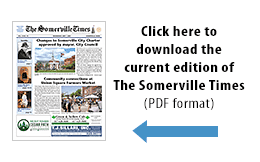 By Joseph A. Curtatone
By Joseph A. Curtatone
(The opinions and views expressed in the commentaries of The Somerville News belong solely to the authors of those commentaries and do not reflect the views or opinions of The Somerville News, its staff or publishers.)
Just one hundred yards across the Mystic River from Somerville’s burgeoning Assembly Square neighborhood lies the proposed site for a 19-story casino in Everett. Somerville and other cities in the region, none of which have a vote on the proposal, are staring down the negative impacts this casino would levy on our local businesses, economic activity, social well-being and our health.
On Somerville’s side of the Mystic River at Assembly Row, we are building a livable, walkable, bikeable, transit-accessible community with a sustainable economic base. It’s the payoff from prudent investments in infrastructure. We’re bringing in transit with the new Orange Line station. We’re breaking ground on new homes and office buildings, restaurants and stores. We’re unlocking the magic of the waterfront with a new 6-acre park. We’re building a neighborhood that will both cultivate a better quality of life and strengthen our tax base to help pay for citywide public services. We have learned from the past to play the long game not the short game, to be diligent not desperate.
On the Everett side of the river, it’s a very different story. They are talking about building a casino, a myopic and volatile strategy that has a detrimental impact on quality of life and drains the tax base, requiring more and more city expenditures and services to counter its impact. The data shows that when casinos go up, crime and other social ills go up with them while spending at area businesses goes down. What looks now like the promise of glamour and glitz is nothing more than fool’s gold. There could not be a bigger contrast between two sites a hundred yards apart.
Playing the short game with a casino threatens the local businesses that form the backbone of our city and regional economy. One of the dollar figures being waved in front of Everett’s nose is $50,000 worth of vouchers to Everett restaurants and local businesses. These vouchers would be given for free to gamblers at the casino. But gamblers do not tend to stand up from the slot machine and decide to drive elsewhere to shop or eat. The longest distance gamblers travel when visiting a casino is from the parking lot to the casino’s front door.
In Atlantic City, one-third of the city’s retail businesses closed within four years after the casinos opened. Within 20 years, two-thirds of the city’s independent restaurants had also closed. Similar statistics abound in casino areas. No amount of free vouchers can compensate for the decimation of one- to two-thirds of local businesses.
Somerville’s core value is to make our city a great place to live, work, play and raise a family. Casinos hurt families. Between 1990 and 1998, as increasing numbers of states legalized casinos, Gamblers Anonymous chapters more than doubled according to the National Gambling Impact Study Commission. In a survey of nearly 400 Gamblers Anonymous members, 28 percent reported either a gambling-related divorce or separation and others admitted their gambling had led them to stealing, bankruptcy or thoughts of suicide. We should be building healthy families, not introducing ways to break them.
An Everett casino would also worsen traffic and pollution. Somerville and communities around the proposed casino site already have several environmental justice zones, where people face a disproportionate burden of traffic-related pollution. We’re working to correct this by investing in alternative transportation, or by advocating for the grounding of McGrath Highway, which the state just announced it will transform into a ground-level boulevard. But now, just as we’re making progress, we again face increased traffic impact. An exhaustive study by MIT and University of California at Berkeley researchers pinpointed the most traffic-congested Boston-area neighborhoods, and Everett was one of the worst. A casino would only exacerbate that problem, rippling through the entire metro area.
In 2007, as president of the Massachusetts Mayors’ Association, I hosted a panel of casino experts in Somerville. Two were in favor of casinos and one was opposed, but they all agreed on one thing: You do not place casinos where you already have an established economic base. You create a destination resort. Not only has the Commonwealth taken the ill-advised step of allowing casinos in Massachusetts at all, but it is also allowing one in the urban core. It defies common sense.
Massachusetts’ casino law alludes to regional cooperation in terms of mitigation, but then contradicts itself by taking a narrow approach to who has a say in where casinos are placed. Only Everett residents can vote on whether Las Vegas tycoon Steve Wynn can build his casino here on the Mystic, but Somerville, Charlestown, Chelsea, even Medford and Malden and beyond will be impacted. None of those communities have a say. The facts will have to instead speak loudly for us. We need to slow down and look at the data, not the spinning dollar signs.
















Reader Comments